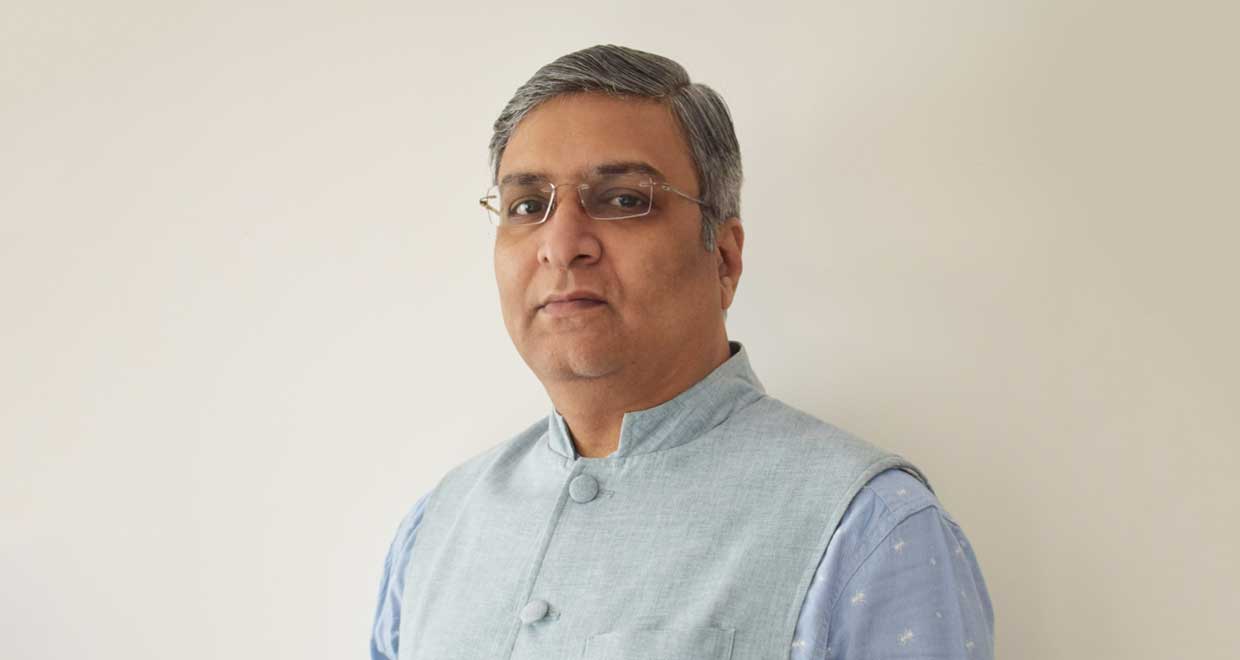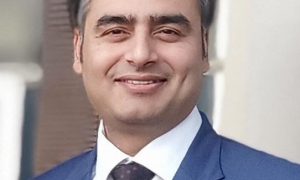Chakradhar Varadarajan holds a Bachelor of Law degree from the first batch of five-year law course (1983-’88) from the Government Law College affiliated to Bharathiar University, Coimbatore, Tamil Nadu, India. He is the Head-Corporate Legal in Godrej Industries Limited (GIL). He is also the authorised signatory for Godrej Consumer Products Limited (GCPL) and Nature’s Basket Limited (NBL).
Chakradhar’s current role is to add value to the businesses as a trusted advisor, shape up and maintain a client-focused in-house legal team. His work areas engage him to manage and advice on risk analysis and mitigation including M&A, indirect taxation, brand protection enforcement, business advisory, compliance and regulatory aspects.
In this interview, he speaks to us about:
- His decision to choose a five-year law course at a very nascent stage of Indian legal education
- The culture back in his college days.
- His role and responsibilities as Head-Corporate Legal in Godrej Industries Limited (GIL).
- The reason behind giving up litigation practice and accepting an in-house legal counsel role.
How would you like to introduce yourself to our readers?
I am a student. I continue to learn every day.
What prompted you to choose a five-year law course?
(The five-year law course was newly introduced at that time.)
Most of my junior college buddies were focussed on graduating as either engineers or as doctors. A new engineering college was set up in our town back then and also a renowned Government medical college. Probably this contributed to many of them opting to becoming engineers or doctors.
My upbringing in a middle class family of a State Government employee (my father) and the situation of two of my elder siblings already aiming then to become doctors made me think differently.
Living in Kurnool town surrounded by an agrarian economy in a drought-prone region of the undivided Andhra Pradesh, I was more influenced by the agenda and focus set for social and industrial development by Telugu Desam, CPI & CPM. I was keen to talk about the growth of industry & commerce in the region. Kurnool, Anantapur, Nandyal, Tirupati in particular started looking out for industrial and educational renaissance.
Rayalaseema Paper Mills had just started production in those days, granite export industry was slowly picking up, Tungabhadra Industries Limited was producing vegetable oil products including Vanaspati locally and APIIDC was taking steps to create industrial parks. Amidst such socio-political-industrial climate, the travel of my thoughts took direction of further studies in commerce and law.
Had it not been for Justice Chandrachud (Retd) starting a five-year law course in the 4 law colleges of Tamil Nadu (Chennai, Trichy, Madurai & Coimbatore) during mid-1983, preceded by a newspaper advertisement issued by the Directorate of Legal Education, Tamil Nadu, I probably would have turned a commerce graduate in Venkateshwara University and opt for a 3 year law degree in Anantapur or Hyderabad.
How was the culture back in your college days (1983-’88)?
I joined five-year law in Coimbatore, a city that was fairly well industrialised in 1983 with many textile machinery manufacturing units & spinning mills (serving as the back office for the Mumbai mills).
No other State (including Andhra Pradesh) started any such course in law by then and National Law Schools were not even established. The experience of being soaked in a completely different and industrially vibrant atmosphere as well as being in an educational hub of Tamil Nadu planted bigger dream of managing and leading legal services for companies, early in life.
Our college being a Government Law College, resources for us were limited so, the students of 3 year law batch & five-year law batch both used to attend college in the same premises in morning and afternoon sessions respectively.
India’s gender diversity efforts & girl child education were getting evident in the early ‘80s itself basis the statistics that in our own law class. We were a total of 78 students of which 18 were girls. Some of them are doing well now in the profession and practising law in courts today.
Our five-year law curriculum being new, some of the books prescribed for study were not available in stores or our own college library, so we undertook visits to State and/or District libraries in different cities to gather material to study and used to share notes with other classmates.
With no internet and Google, no online research tools, preparing for inter-collegiate debates, competitions or moots was a group activity with a lot of excitement peppered with visits to other educational institutions as well as local courts in search of willing seniors who could guide us regarding various topics.
Our professors treated us more lovingly as we were seen as fresh and young buds who were enthusiastic to listen, be more regular to attend lectures and moots.
Our initial law college studies also involved the experience of receiving guest lectures from professors of other colleges teaching liberal arts (Political Science, Sociology & Economics, History of India & developments leading to Constitution) as our 1st 2 years curriculum was mostly related to these subjects, apart from English, Logic & Reasoning, and Legal Writing in Tamil.
How did you overcome your initial jitters in a courtroom full of experienced lawyers and judges?
(He holds the distinction of being the first ever five-year law graduate to be enrolled as an Advocate in 1988 with the Bar Council of Andhra Pradesh, Hyderabad.)
Preparing for the day of enrolment, wearing that black coat, tying up the white bands around neck and entering the High Court of A.P in Hyderabad with a gown on the shoulders had been a ‘dream come true’ (which actually was not so financially, as I experienced later in courts for about two and a half years but I had to go through that phase as part of the process).
Joining a chosen senior’s office (after closely following up as to whom to join) and then getting paid Rs.750/-, a princely sum back then at the end of the first month (when no other senior counsel generally paid money to any junior) is a cherished high. A High Court judge and a District Court judge encouraging me to argue the senior’s brief and guiding me while I put across a defence. Such experiences probably are rare now due to paucity of time in courts today. The attention and time the judges gave for testing the skills of juniors like me, to observe and correct the preparedness was also a blessed high. When a District Judge advised me stoutly across the bench in an open court stating professional ethics demand that an Advocate should not visit a complainant’s home and talk of settlement on behalf of the client who engaged him was a low and as well as a learning moment.
What lead you to give up litigation practice for accepting in-house legal counsel role?
Prior to fully involving in active court practice, I attended a corporate internship in Hyderabad, a first for me in a reputed corporate group in Hyderabad. Almost 2 years later, I was blessed with an enquiry from them as to my interest in a vacant position of ‘Law Officer’. Based on the evaluation of my socio-economic background coupled with my own need for a stable income and a big dream of going in-house, I said yes to such an opportunity. I consider myself lucky too that my joining as in-house counsel coincided with onset of liberalisation in 1991. On personal front, the contributing factor to be unwavering in continuing to being in-house counsel was the loss of my mother a year later and then marital responsibility. There was no looking back after I joined in-house, though I did have a fair share of mirage of reflections to see myself as a practising Advocate to which I did not yield to!
How are internships helpful for a law student? How was the scenario back in your days?
Internship in an Advocate’s office and attending the courts were part of planned curriculum for our five-year law study.
Our internship was for the entire five years of study. We would start by 8.30am in the morning in our assigned law office, work there first and move into Court and be present there until 1.00pm and later on, reach our Advocate’s office again by 5.00pm and remain there until 8.30pm. Such hours of internships for learning were possible since our classroom lectures were between 1.30pm to 5.30pm.
The curriculum made it mandatory for us to attend a senior Advocate’s office, learn drafting, observe client guidance by the senior as well as work of the court clerks, do case law research, know professional etiquette and ethics, observe and learn court decorum. At the end of the year, we had to submit a project paper over the aspects learnt in our internship. All our learning during such internship was assessed for marks as our internals by our college.
I am happy that now, apart from internships in law firms, students of law also have the benefit of focussing on gaining knowledge through internships in corporates. Such internships are no doubt preparing the law students to be much more agile, employable and professional and learn a lot about crucial transactional non-litigation work which is a large share of corporate in-house roles.
Currently, you are the Head-Corporate Legal in Godrej Industries Limited (GIL). What are your roles and responsibilities?
Our team in Godrej Corporate Legal has about 11 in-house counsel and 2 paralegals. The team has 4 sub-function group heads. Sub-function head managers are there for (i) Contracts, M&A and business/category advisory; (ii) Brand Protection/IPR, category advisory & International business; (iii) Indirect taxes management and (iv) Litigation management.
My role as strategic function business partner is to provide in-house legal services for the Consumer Goods, Chemicals, Retailing and Corporate HO. The role also partners with Godrej’s M&A team initiatives for inorganic growth of the consumer goods business in Indonesia, in Africa for about 14 countries, the USA, Chile & Argentina.
An average work-day in Godrej is ‘a day to look forward to’ since the consumer goods, the most dynamic amongst all, sets up an agenda of good amount of in-house legal service activity both for India as well as overseas. At the same time, the work-life balance afforded to the employees by Godrej are of world-class standards offering us flexible working hours (core hours being defined as 10.30am to 5.00pm), well laid out policy on gender diversity and inclusion, a ‘work from home’ facility when required and approval for sick leave without a limit when such a situation arises.
Godrej’s philosophy of human resource assessment relies on 3 key pillars (Leading Self, Leading Others, and Leading Business).Further, ‘the Godrej way’ makes it important to constantly remind myself about ‘Godrej way and the Purpose/Objective’, the importance of ‘Trust’, the characteristic to ‘Be Bold’, to undertake the best effort and ‘Create Delight’ for your customers and therefore ‘Own it’ to deliver, and simultaneously ‘Be Humble’ and ‘Show Respect’ to people as much as you expect from them.
What are the qualities which Godrej looks for in one’s CV while applying for internship?
GIL offers law students internships and the intake is limited to 2 students per annum at present. The applications for such internships are received processed by our Corporate HR based on prior assessment and notification of such intern needs by the heads of the sub-function groups.
Criteria in Godrej for assessment of any candidate’s CV are (i) individual’s Initiative, (ii) hunger to learn & improve, (iii) emotional and social awareness and (iv)positive mind-set for collaboration’.
You were bestowed with “India’s finest in-house counsel” in 2016 .What is the success mantra?
(This recognition is given by the Indian Corporate Counsel Association & the Ministry of Commerce.)
Any bright young lawyer who is able to practise the following principles will definitely taste success and will himself amongst ‘successful in-house counsel in India’ :
1) Believe in yourself; 2) Be humble to learn every day; 3) Be respectful of others; 4) Have patience to practise and persevere and (5) Accept to kiss & hug any change.
























